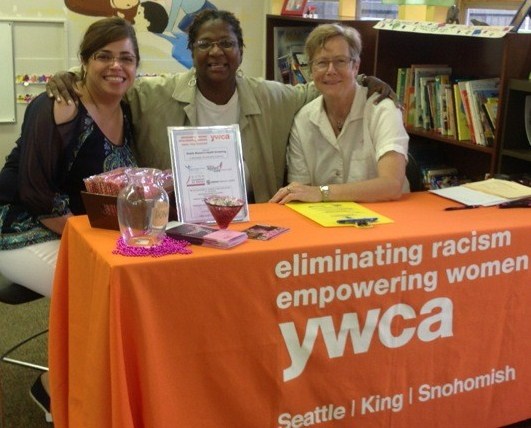It is really early in the morning and once again the phone alarm clock is ringing. It has been cold lately and your warm bed with fluffy pillows probably feel quite nice. You would love to snuggle deep under the covers and go back to sleep. Yet like many of us, you have to go to work!
Have you ever taken time to stop and consider how many lives the work you do really affect? Come on, pause for a minute and think about it!
As I prepared to write this post, I instinctively thought of Thanksgiving. No, I didn’t think of the meal I would eat or whether or not the Seattle Seahawks will beat the San Francisco 49ers this week! My mind drifted to the women we serve through Women’s Health Outreach at the YWCA!
Between July 2013 and June 2014, our team of three provided 7,658 individuals – mostly women – with educational information and materials regarding breast cancer and the importance of cancer screenings! Of this number, 445 women attended one of our monthly community mobile mammogram events in King County and had a mammogram. As a result of these mammogram events, breast cancer was found and treated in two women! Imagine the sighs of relief and the depths of appreciation from these women and their families.
Even though the people represented above entrusted Women’s Health Outreach with their health care and health education, we could never have done any of it without the Breast, Cervical, and Colon Health Program of Washington State, the Puget Sound Susan G. Komen Foundation, Swedish Medical Center, or the many donors who contribute dollars to help offset the cost of services provided.
In addition, we are grateful for the churches, schools, mosques, temples, stores, businesses and community centers that allow us to use space in their facilities to work with our patrons. And of course we can never forget our volunteers: Mrs. Etta, Mom Emma Guiterrez, Agnes, Gabby, Jenn and Letitia for supporting the cause, our work and the women we serve.
Finally, we would like to thank our co-workers at the YWCA, friends, and families for everything done to give our careers a sense of purpose!
Although Women’s Health Outreach is a small program of Health Access within the YWCA of Seattle, we are grateful this Thanksgiving! Please take a few moments and share the things you are thankful for with us and others.
Happy Thanksgiving.



